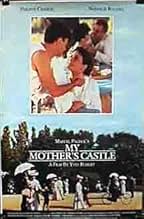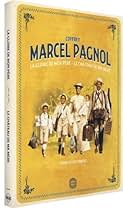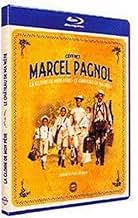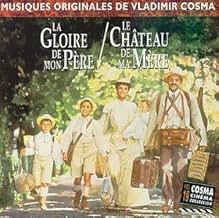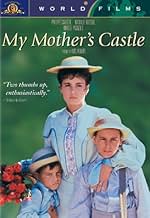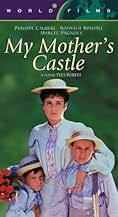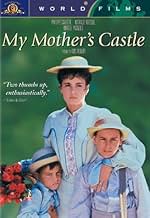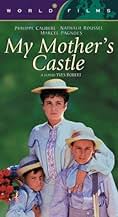AVALIAÇÃO DA IMDb
7,6/10
6 mil
SUA AVALIAÇÃO
Todas as férias, Marcel e sua família vão para sua casa de campo perto de Marselha. Durante uma dessas férias, ele conhece Isabelle, uma garota bonita, mas convencida.Todas as férias, Marcel e sua família vão para sua casa de campo perto de Marselha. Durante uma dessas férias, ele conhece Isabelle, uma garota bonita, mas convencida.Todas as férias, Marcel e sua família vão para sua casa de campo perto de Marselha. Durante uma dessas férias, ele conhece Isabelle, uma garota bonita, mas convencida.
- Direção
- Roteiristas
- Artistas
- Prêmios
- 1 vitória e 6 indicações no total
Jean-Pierre Darras
- Récitant
- (narração)
- …
- Direção
- Roteiristas
- Elenco e equipe completos
- Produção, bilheteria e muito mais no IMDbPro
Avaliações em destaque
I'd recommend this film very strongly to movie lovers.
Oh, you'll have to read the subtitles. It's French... don't be afraid... this film makes complete sense to any audience and is not art for art's sake.
But hey, you wouldn't be reading these comments if you weren't intelligent and discerning, so subtitles wouldn't be a problem, I know.
Really, give it a try. The other comments on this movie are absolutely correct. It is completely charming and will hold you in it's influence for the whole movie. Mostly the story of a the relationship between a small boy and a girl he meets. Well-observed, hilariously funny in parts. Exquisite acting of the first order. You'll never forget it. Give it a try.
Oh, you'll have to read the subtitles. It's French... don't be afraid... this film makes complete sense to any audience and is not art for art's sake.
But hey, you wouldn't be reading these comments if you weren't intelligent and discerning, so subtitles wouldn't be a problem, I know.
Really, give it a try. The other comments on this movie are absolutely correct. It is completely charming and will hold you in it's influence for the whole movie. Mostly the story of a the relationship between a small boy and a girl he meets. Well-observed, hilariously funny in parts. Exquisite acting of the first order. You'll never forget it. Give it a try.
I first saw Le Château de ma mère and La Gloire de mon père shortly after their release in 1990. At first, I gave a higher ranking to Le Château. I just saw the two movies again, and now it's La Gloire who's coming on first.
But it is not to say that Le Château is not a good movie. It's an EXCELLENT movie. The saga of Marcel continues. Young Marcel Pagnol that is. The cast is again great: Philippe Caubère and Nathalie Roussel shine, Juline Ciamaca does a great job as Marcel.
And, once again, we get a taste of life in France's countryside, its colors, its ways of doing things. Great!
Too bad, there was not a third movie to follow La Gloire and Le Château.
See this one!
Out of 100, I gave it 86. That's good for ***½ out of ****. I gave La Gloire de mon père the same star rating, but 87 out of 100.
Seen again at home, in Toronto, on August 11th, 2002.
But it is not to say that Le Château is not a good movie. It's an EXCELLENT movie. The saga of Marcel continues. Young Marcel Pagnol that is. The cast is again great: Philippe Caubère and Nathalie Roussel shine, Juline Ciamaca does a great job as Marcel.
And, once again, we get a taste of life in France's countryside, its colors, its ways of doing things. Great!
Too bad, there was not a third movie to follow La Gloire and Le Château.
See this one!
Out of 100, I gave it 86. That's good for ***½ out of ****. I gave La Gloire de mon père the same star rating, but 87 out of 100.
Seen again at home, in Toronto, on August 11th, 2002.
"O for one of those hours of gladness. Gone alas with our youth too soon"*
My Mother's Castle picks up where My Father's Glory left off, tracing young Marcel's life over the next year as his enchanting remembrances of things past comes full circle. If you were nostalgic for the south of France after seeing My Father's Glory, you do not have to wait long to once again smell the sprigs of wild thyme. After resuming their life again in Marseilles, the family: Joseph (Philippe Caubere), Augustine (Nathalie Roussel), Marcel (Julien Ciamaca), brother Paul (Victorien Delamare) and baby sister decide to return to Provence for Christmas and then again at Easter.
Marcel is reunited with his friend Lili but soon discovers the charms of women in the person of Isabelle (Julie Timmerman), a somewhat snooty young lady who takes on the affectation of nobility to impress (and dominate) Marcel. Their relationship shows promise but comes to an abrupt end early in the film when Isabelle's family suddenly leaves. Soon Augustine has the idea of returning to their country home each weekend. This, however, presents a small problem. Aside from the fact that Joseph, with the aid of Augustine's charms, must rearrange his teaching schedule, the family must walk five miles from the trolley station to their country home using up much of their weekend time.
This problem is solved when Joseph meets Bouzique (Philippe Uchan), one of his former pupils. Bouzique is a canal guard who shows them how to cut eight hours from their weekly walk by illegally cutting over other people's property that runs along the canal. At first Joseph is reluctant but finally agrees. This takes on an air of great adventure and humor as Bouzique gives a key to Joseph who must unlock the doors on each estate that stand in his way. The walk becomes the focus of the film, as everyone in the group must carefully avoid drawing attention to themselves. One house in particular, owned by a grouchy caretaker and a surly dog named Masher, causes Augustine to be quite fearful. Like My Father's Glory, My Mother's Castle consists of charming vignettes that evoke a simpler time. The film works its way into our heart because the characters care about each other and we care about them. Like all idealized reflections of the past, however, it ultimately gives way to bittersweet reality, reminding us very gently how soon youth passes, but as poet Shelley put it, "Our sweetest songs are those that tell of saddest thought".
*From Kerry Dances by James Lynam Molloy
My Mother's Castle picks up where My Father's Glory left off, tracing young Marcel's life over the next year as his enchanting remembrances of things past comes full circle. If you were nostalgic for the south of France after seeing My Father's Glory, you do not have to wait long to once again smell the sprigs of wild thyme. After resuming their life again in Marseilles, the family: Joseph (Philippe Caubere), Augustine (Nathalie Roussel), Marcel (Julien Ciamaca), brother Paul (Victorien Delamare) and baby sister decide to return to Provence for Christmas and then again at Easter.
Marcel is reunited with his friend Lili but soon discovers the charms of women in the person of Isabelle (Julie Timmerman), a somewhat snooty young lady who takes on the affectation of nobility to impress (and dominate) Marcel. Their relationship shows promise but comes to an abrupt end early in the film when Isabelle's family suddenly leaves. Soon Augustine has the idea of returning to their country home each weekend. This, however, presents a small problem. Aside from the fact that Joseph, with the aid of Augustine's charms, must rearrange his teaching schedule, the family must walk five miles from the trolley station to their country home using up much of their weekend time.
This problem is solved when Joseph meets Bouzique (Philippe Uchan), one of his former pupils. Bouzique is a canal guard who shows them how to cut eight hours from their weekly walk by illegally cutting over other people's property that runs along the canal. At first Joseph is reluctant but finally agrees. This takes on an air of great adventure and humor as Bouzique gives a key to Joseph who must unlock the doors on each estate that stand in his way. The walk becomes the focus of the film, as everyone in the group must carefully avoid drawing attention to themselves. One house in particular, owned by a grouchy caretaker and a surly dog named Masher, causes Augustine to be quite fearful. Like My Father's Glory, My Mother's Castle consists of charming vignettes that evoke a simpler time. The film works its way into our heart because the characters care about each other and we care about them. Like all idealized reflections of the past, however, it ultimately gives way to bittersweet reality, reminding us very gently how soon youth passes, but as poet Shelley put it, "Our sweetest songs are those that tell of saddest thought".
*From Kerry Dances by James Lynam Molloy
Almost three decades later,Yves Robert comes back to what he does best:childhood movies."La guerre des boutons" (1962) was the first work featuring almost only brats.It was a timeless blockbuster in France and an (English or Irish) remake was made a few years ago.
Yves Robert tackles here Pagnol 's autobiographical books and transfers them to the screen with taste ,humor and magic.Magic is everywhere as Robert perfectly recreates those little simple pleasures of long ago."Le château de ma mère" is the follow-up to "La gloire de mon père".Both movies are likable,Robert showing tenderness for his characters:The enthusiastic atheist father (Philippe Caubère), the mother everybody would like to have (Nathalie Roussel),their two children ,Marcel -who would become the great director and writer- and his brother"petit Paul", the Christian uncle Jules who prays for his heathen brother-in-law,and plays the occasional Father Christmas. A lot of colorful secondary characters adds to the enchantment:Lili,the little boy of the garrigue,a girlie,some kind of stuck-up thing,a noble who's a true gentleman,a wicked warden(One of Jean Carmet's last parts) who's got instructions by way of heart.
The main difference between "le château de ma mère" and the first part "la gloire de mon père" lies in the fact that the former opens the gates of life(not only the gates the father illegally opens) .The conclusion is very harsh,but Robert avoids pathos and melodrama.It does not prevent us,though,after three hours (the two movies together) in these green pastures of childhood paradise,from getting a bitter taste in the mouth.
Robert knows it:so he ends his work with a wonderful epilogue(faithful to the book) which thoroughly justifies the title.And the audience will leave the Provence,while thinking that here or elsewhere,dreams may come true.
As Pagnol wrote at the end of his book:"life is made of small pleasures and big grieves :don't you tell it to the children"
Yves Robert tackles here Pagnol 's autobiographical books and transfers them to the screen with taste ,humor and magic.Magic is everywhere as Robert perfectly recreates those little simple pleasures of long ago."Le château de ma mère" is the follow-up to "La gloire de mon père".Both movies are likable,Robert showing tenderness for his characters:The enthusiastic atheist father (Philippe Caubère), the mother everybody would like to have (Nathalie Roussel),their two children ,Marcel -who would become the great director and writer- and his brother"petit Paul", the Christian uncle Jules who prays for his heathen brother-in-law,and plays the occasional Father Christmas. A lot of colorful secondary characters adds to the enchantment:Lili,the little boy of the garrigue,a girlie,some kind of stuck-up thing,a noble who's a true gentleman,a wicked warden(One of Jean Carmet's last parts) who's got instructions by way of heart.
The main difference between "le château de ma mère" and the first part "la gloire de mon père" lies in the fact that the former opens the gates of life(not only the gates the father illegally opens) .The conclusion is very harsh,but Robert avoids pathos and melodrama.It does not prevent us,though,after three hours (the two movies together) in these green pastures of childhood paradise,from getting a bitter taste in the mouth.
Robert knows it:so he ends his work with a wonderful epilogue(faithful to the book) which thoroughly justifies the title.And the audience will leave the Provence,while thinking that here or elsewhere,dreams may come true.
As Pagnol wrote at the end of his book:"life is made of small pleasures and big grieves :don't you tell it to the children"
"My Father's Glory," and its sequel "My Mother's Castle," tell the story of a young boy's "wonder years" growing up in a family with an adored father, a lovely but frail mother, and assorted eccentric relatives and friends. These are incredibly charming films that feature none of the violent action and highly charged emotions that we've come to expect in popular films today. Instead, they celebrate the simple joys of life in a warm and loving family. When minor but unexpected events occasionally disrupt the day-to-day flow of events, they can seem like terrible disasters. On the other hand, a simple visit to the country can seem like a tremendous adventure. It's not necessary to have seen "My Father's Glory" to enjoy "My Mother's Castle." In fact, I happened to see them out of order and I loved them just the same. But if I had my preference, I'd watch them in order. The final scene of "My Mother's Castle" is emotionally powerful and satisfying; for me it confirmed that every minute I'd invested in these films was worthwhile. I wanted to get up there on the screen and help. In French with English subtitles.
Você sabia?
- CuriosidadesPagnol had been planning to direct a version of the story as early as 1968 but the project was never completed.
- Citações
Marcel Pagnol: Such is the life of a man. Moments of joy, obliterated by unforgettable sadness. There's no need to tell the children that.
Principais escolhas
Faça login para avaliar e ver a lista de recomendações personalizadas
- How long is My Mother's Castle?Fornecido pela Alexa
Detalhes
- Data de lançamento
- País de origem
- Idiomas
- Também conhecido como
- My Mother's Castle
- Locações de filme
- Empresas de produção
- Consulte mais créditos da empresa na IMDbPro
Bilheteria
- Faturamento bruto nos EUA e Canadá
- US$ 1.477.071
- Faturamento bruto mundial
- US$ 1.477.071
- Tempo de duração1 hora 38 minutos
- Mixagem de som
- Proporção
- 1.85 : 1
Contribua para esta página
Sugerir uma alteração ou adicionar conteúdo ausente

![Assistir a Bande-annonce [OV]](https://m.media-amazon.com/images/M/MV5BNjcxYzZiNGEtMDIyNC00NWZjLWI3YWMtYjBiZTUwNjIzMzNjXkEyXkFqcGdeQXRyYW5zY29kZS13b3JrZmxvdw@@._V1_QL75_UX500_CR0)
